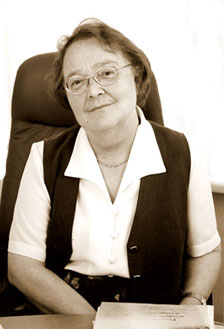Dean of Philological Faculty

Marina L. Remneva, Doctor of Philology, Professor, Dean of the Faculty of Philology of Moscow State University, head of the Department of the Russian Language, specialist in the History of Russian and Old Church Slavonic, was born on March 27, 1936 in the village of Astafyevo, Podolsk District, Moscow Region.
Her father, Leontiy V. Remnev (1902-1969), was a teacher of History and the head of the Podolsk Education Board; her mother, Lyudmila S. Matveyeva (1909-1986), was a teacher of the Russian language and literature and the headmaster of a school in Podolsk.
During the Great Patriotic War the family was evacuated, and upon its return lived in Podolsk until 1953, where Marina finished School No. 1.
From 1953 to 1958 she studied at the Russian department of the Faculty of Philology at Moscow University.
From 1958 to 1961 she worked as a teacher of the Russian language and literature in School No. 3 in Podolsk, and in 1961 entered graduate school at the Russian department of the Faculty of Philology.
Marina Remneva decided to become a scholar because of the prominent Russian linguists Nikolay M. Shansky and Klavdiya V. Gorshkova.
In 1968, under Professor Gorshkova’s supervision, Marina Remneva defended her candidate’s thesis — The Correlation between the System and the Norm in the Usage of Aspect and Tense Forms in the Russian (Great Russian) language of the 15th century (on the written records of north-eastern Russia).
In the same year Marina Remneva started to work as a teacher at the Russian department of the Faculty of Philology.
From 1972 to 1979 she headed the Department of Russian for Foreign Students of the Faculties of Natural Sciences; in 1979 she became associate professor and then professor of the Department of the Russian Language of the Faculty of Philology; in 1981-1991 she was Deputy Dean for Academic Affairs.
In 1970-1972 she taught Russian in the University of Ljubljana (Yugoslavia).
In 1989 she defended her doctoral thesis — The Problem of Grammatical Norm in the History of Literary Russian.
Since 1991 she is the Dean of the Faculty of Philology; since 1995 she is the head of the Department of the Russian Language.
Her academic interests includes the problems of the history of literary Russian in the 11-17th centuries, the evolution and codification of the grammatical norm, and Old Church Slavonic.
Her publications include Aspect and Tense of the Russian Verb (in Diachrony), Moscow, 1984, co-authored with Olga V. Kukushkina, History of Literary Russian. Characteristics of the Grammatical Norm, Moscow, 1988, History of Literary Russian, Moscow, 1995, Old Church Slavonic: Grammar with Texts and Glassary, Moscow, 1999, co-authored with V.S. Savelyev and I.I. Filichev, How Literary Russian was Developing in the 11-17th Centuries, Moscow, 2003; translated into Bulgarian, Sofia, 2006. These attempts to show the history of Old Church Slavonic in its variants between 11th and 17th centuries prove the co-existence of Old Russian and Church Slavonic at the time, typifying the culture of writing in old Russia.
In 2004, Marina Remneva published Old Slavonic Language, a textbook written on the basis of a modern concept and containing a detailed description of the system of Old Slavonic in the 9th-11th centuries. The author pays special attention to the characteristics of Common Slavonic, outlining its development periods from Protoslavonic to Late Common Slavonic and naming the processes and causes. The book analyses various changes reflected in the monuments of Old Slavonic of the late 10th and 11th centuries, showing the development of local variants, including Old Russian, and stressing its role in the history of old literary language. Apart from the description of Old Church Slavonic grammar, the book provides insights into the history of Common Slavonic as an academic discipline and an area of research, handles disputable questions of Paleoslavistics and General Linguistics.
The second edition, Gaudeamus series, 2004, is co-authored with Olga V. Dedova and supplemented by a hypertext CD ROM, which provides illustrative material for making a socio-historical context for the facts of Old Church Slavonic grammar. This training set was awarded a special diploma of the Book of the Year national contest in 2005.
At the Faculty of Philology Marina Remneva reads general courses in Old Church Slavonic and Historical Grammar of the Russian Languages, special courses in the History of the Grammatical Norm in the Monuments of Slavonic Writing, Issues of the Linguistic Norm of the Historic East Slavic Business Language, as well as special courses on the issues of aspect and tense of the verb, issues of the structure of East Slavic grammars of the Old Church Slavonic of the 14-17th centuries, methods of describing and studying Old Church Slavonic as a literary language of the pre-national period.
Marina Remneva is the editor-in-chief of the Vestnik Moscovskogo Universiteta. Philology (Moscow University Bulletin. Philology) and Acta philologica journals, associate editor of the Issues of Russian Studies series, member of the editorial board of Ancient Russia: Problems of Medievalistics, full member of the International Informatisation Academy, International Education Academy, chair of the Specialised Committee on Methods of Teaching Russian as a Foreign Language, chair of the Council on Philology of the Methodical Association on Classical Education of the Russian Federation, member of the Contest Committee of the Russian Language Federal Program , member of the Council on the Russian Language of the Russian Government.
Her awards include Order of Honour, In Memory of 850th Anniversary of Moscow Medal, Alexander Pushkin Medal, and Badge of the Highest Honour of Soka University (Japan).
In 2004, for the series of academic works on the history of Russian literary language of the 11-17th centuries, Marina Remneva received the Lomonosov Grant, 1st degree.